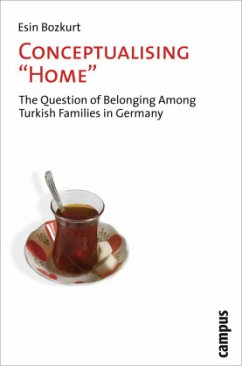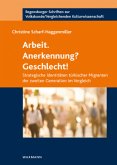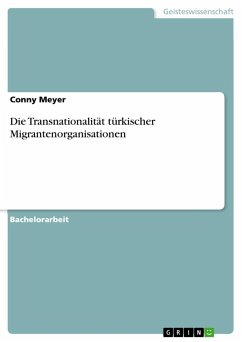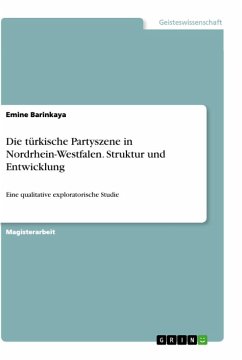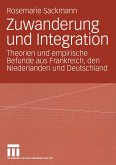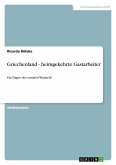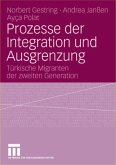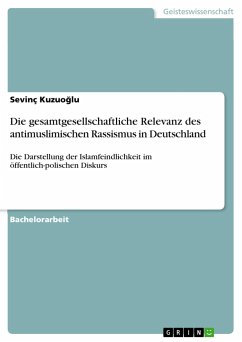- Broschiertes Buch
- Merkliste
- Auf die Merkliste
- Bewerten Bewerten
- Teilen
- Produkt teilen
- Produkterinnerung
- Produkterinnerung
Sechs türkische Familien in Deutschland sprechen über ihre Vorstellungen von Heimat. Frauen und Männer aus drei Generationen schildern, wo sie sich ethnisch, kulturell, religiös und national zugehörig fühlen. Die individuellen Migrationserfahrungen und Lebensumstände führen zu vielfältigen Formen der Selbstverortung. Einmal mehr wird hier deutlich, wie eng Integration, Identifikation und Anerkennung miteinander verknüpft sind.
Andere Kunden interessierten sich auch für
![Arbeit. Anerkennung? Geschlecht! Arbeit. Anerkennung? Geschlecht!]() Christine Scharf-HaggenmillerArbeit. Anerkennung? Geschlecht!44,90 €
Christine Scharf-HaggenmillerArbeit. Anerkennung? Geschlecht!44,90 €![Die Transnationalität türkischer Migrantenorganisationen Die Transnationalität türkischer Migrantenorganisationen]() Conny MeyerDie Transnationalität türkischer Migrantenorganisationen27,95 €
Conny MeyerDie Transnationalität türkischer Migrantenorganisationen27,95 €![Die türkische Partyszene in Nordrhein-Westfalen. Struktur und Entwicklung Die türkische Partyszene in Nordrhein-Westfalen. Struktur und Entwicklung]() Emine BarinkayaDie türkische Partyszene in Nordrhein-Westfalen. Struktur und Entwicklung47,95 €
Emine BarinkayaDie türkische Partyszene in Nordrhein-Westfalen. Struktur und Entwicklung47,95 €![Zuwanderung und Integration Zuwanderung und Integration]() Rosemarie SackmannZuwanderung und Integration49,99 €
Rosemarie SackmannZuwanderung und Integration49,99 €![Griechenland - heimgekehrte Gastarbeiter Griechenland - heimgekehrte Gastarbeiter]() Ricarda RölekeGriechenland - heimgekehrte Gastarbeiter17,95 €
Ricarda RölekeGriechenland - heimgekehrte Gastarbeiter17,95 €![Prozesse der Integration und Ausgrenzung Prozesse der Integration und Ausgrenzung]() Norbert GestringProzesse der Integration und Ausgrenzung64,99 €
Norbert GestringProzesse der Integration und Ausgrenzung64,99 €![Die gesamtgesellschaftliche Relevanz des antimuslimischen Rassismus in Deutschland Die gesamtgesellschaftliche Relevanz des antimuslimischen Rassismus in Deutschland]() Sevinç KuzuogluDie gesamtgesellschaftliche Relevanz des antimuslimischen Rassismus in Deutschland17,95 €
Sevinç KuzuogluDie gesamtgesellschaftliche Relevanz des antimuslimischen Rassismus in Deutschland17,95 €-
-
-
Sechs türkische Familien in Deutschland sprechen über ihre Vorstellungen von Heimat. Frauen und Männer aus drei Generationen schildern, wo sie sich ethnisch, kulturell, religiös und national zugehörig fühlen. Die individuellen Migrationserfahrungen und Lebensumstände führen zu vielfältigen Formen der Selbstverortung. Einmal mehr wird hier deutlich, wie eng Integration, Identifikation und Anerkennung miteinander verknüpft sind.
Hinweis: Dieser Artikel kann nur an eine deutsche Lieferadresse ausgeliefert werden.
Hinweis: Dieser Artikel kann nur an eine deutsche Lieferadresse ausgeliefert werden.
Produktdetails
- Produktdetails
- Verlag: Campus Verlag / University of Chicago Press
- Artikelnr. des Verlages: 38791
- Seitenzahl: 243
- Erscheinungstermin: März 2009
- Englisch
- Abmessung: 214mm x 141mm x 18mm
- Gewicht: 322g
- ISBN-13: 9783593387918
- ISBN-10: 3593387913
- Artikelnr.: 25669837
- Herstellerkennzeichnung Die Herstellerinformationen sind derzeit nicht verfügbar.
- Verlag: Campus Verlag / University of Chicago Press
- Artikelnr. des Verlages: 38791
- Seitenzahl: 243
- Erscheinungstermin: März 2009
- Englisch
- Abmessung: 214mm x 141mm x 18mm
- Gewicht: 322g
- ISBN-13: 9783593387918
- ISBN-10: 3593387913
- Artikelnr.: 25669837
- Herstellerkennzeichnung Die Herstellerinformationen sind derzeit nicht verfügbar.
Esin Bozkurt, Dr. rer. pol., studierte in Istanbul Psychologie, Soziologie und Kultursoziologie und promovierte an der Universität Bremen.
Table of Contents Acknowledgements Introduction 1 Migration and belonging 1.1 Defining home across three socio-linguistic contexts Home and homeland in Turkish context - Home and homeland in German context - Related concepts 1.2 Mobility and home Migration, resettlement and the making of home - Reconceptualising home 2 Contextualising "home": Turkish immigrants in Germany 2.1 Turkish migration to Germany Migration and resettlement - Migrancy, longing and belonging - Religious home-making abroad - Crystallisation of belongings -Conclusions and open questions 2.2 Children of Turkish emigrants in the literature Experiences with exclusion - Finding feet in the battlefield - Spatial and cultural references - Religious belonging consolidated and transformed - Sympathetic others and suffering companions - Conclusions and open questions 3 Gender, migration and belonging 3.1 The question of gender in migration research 3.2 Gendered facets of Turkish migration to Germany 3.3 Women and home 3.4 Conclusions and outlook 4 Empirical Research 4.1 Recapitulating research objectives 4.2 Research questions 4.3 Research methods Qualitative research: Problem-centred interviews - In the field - Access to the sample - Introducing families - Conducting interviews - The language of interviews - The transcription of interviews - Data analysis 5 The question of belonging across three generations 5.1 From guests to commuters: The first generation The experience of migration - Loss of status - Temporality - The making of home as a guest -Conclusions: From a airy home to a heavy life 5.2 Claiming home: The second generation The profile of the second generation - From Turkey to Germany - Schooling in Germany: Initial Difficulties - Experiences in Germany and changing relations with Turkey - Difference and exclusion - Back at home as a guest - The question of belonging - Conclusions: Questioning home as children of the first generation and parents of the third generation 5.3 Fighting for belonging: The third generation The profile of the third generation in the sample - Living and grounding in Germany with backups and emergency exits - Escape from reality, sheltering in roots - Dealing with the present: Reborn Turks, Muslims and other Others - Conclusions: Incomplete lives, substitute homes 6 Gendered (re)constructions of "home": Turkish men and women in Germany 6.1 Gender in migration process Gender differences in the experience of migration - Employment of Turkish women - Experiences in Germany and in Turkey 6.2 Gendered (re)constructions of home Home as conceptualised by women - Home as conceptualised by men 6.3 Gendered return orientations 6.4 Conclusions 7 Belonging at the crossroads of gender and generations 7.1 Common themes and shared patterns of intergenerational communications across six turkish families 7.2 Differences across families: Changing emphases on culture, nation and religion 7.3 Gendered communication of belonging across generations Women and communication - Men and communication 7.4 Conclusions Conclusion List of Tables Bibliography AppendixTable of Contents
Acknowledgements
Introduction
1 Migration and belonging
1.1 Defining home across three socio-linguistic contexts
Home and homeland in Turkish context - Home and homeland in German context - Related concepts
1.2 Mobility and home
Migration, resettlement and the making of home - Reconceptualising home
2 Contextualising "home": Turkish immigrants in Germany
2.1 Turkish migration to Germany
Migration and resettlement - Migrancy, longing and belonging - Religious home-making abroad - Crystallisation of belongings -Conclusions and open questions
2.2 Children of Turkish emigrants in the literature
Experiences with exclusion - Finding feet in the battlefield - Spatial and cultural references - Religious belonging consolidated and transformed - Sympathetic others and suffering companions - Conclusions and open questions
3 Gender, migration and belonging
3.1 The question of gender in migration research
3.2 Gendered facets of Turkish migration to Germany
3.3 Women and home
3.4 Conclusions and outlook
4 Empirical Research
4.1 Recapitulating research objectives
4.2 Research questions
4.3 Research methods
Qualitative research: Problem-centred interviews - In the field - Access to the sample - Introducing families - Conducting interviews - The language of interviews - The transcription of interviews - Data analysis
5 The question of belonging across three generations
5.1 From guests to commuters: The first generation
The experience of migration - Loss of status - Temporality - The making of home as a guest -Conclusions: From a airy home to a heavy life
5.2 Claiming home: The second generation
The profile of the second generation - From Turkey to Germany - Schooling in Germany: Initial Difficulties - Experiences in Germany and changing relations with Turkey - Difference and exclusion - Back at home as a guest - The question of belonging - Conclusions: Questioning home as children of the first generation and parents of the third generation
5.3 Fighting for belonging: The third generation
The profile of the third generation in the sample - Living and grounding in Germany with backups and emergency exits - Escape from reality, sheltering in roots - Dealing with the present: Reborn Turks, Muslims and other Others - Conclusions: Incomplete lives, substitute homes
6 Gendered (re)constructions of "home": Turkish men and women in Germany
6.1 Gender in migration process
Gender differences in the experience of migration - Employment of Turkish women - Experiences in Germany and in Turkey
6.2 Gendered (re)constructions of home
Home as conceptualised by women - Home as conceptualised by men
6.3 Gendered return orientations
6.4 Conclusions
7 Belonging at the crossroads of gender and generations
7.1 Common themes and shared patterns of intergenerational communications across six turkish families
7.2 Differences across families: Changing emphases on culture, nation and religion
7.3 Gendered communication of belonging across generations
Women and communication - Men and communication
7.4 Conclusions
Conclusion
List of Tables
Bibliography
Appendix
Acknowledgements
Introduction
1 Migration and belonging
1.1 Defining home across three socio-linguistic contexts
Home and homeland in Turkish context - Home and homeland in German context - Related concepts
1.2 Mobility and home
Migration, resettlement and the making of home - Reconceptualising home
2 Contextualising "home": Turkish immigrants in Germany
2.1 Turkish migration to Germany
Migration and resettlement - Migrancy, longing and belonging - Religious home-making abroad - Crystallisation of belongings -Conclusions and open questions
2.2 Children of Turkish emigrants in the literature
Experiences with exclusion - Finding feet in the battlefield - Spatial and cultural references - Religious belonging consolidated and transformed - Sympathetic others and suffering companions - Conclusions and open questions
3 Gender, migration and belonging
3.1 The question of gender in migration research
3.2 Gendered facets of Turkish migration to Germany
3.3 Women and home
3.4 Conclusions and outlook
4 Empirical Research
4.1 Recapitulating research objectives
4.2 Research questions
4.3 Research methods
Qualitative research: Problem-centred interviews - In the field - Access to the sample - Introducing families - Conducting interviews - The language of interviews - The transcription of interviews - Data analysis
5 The question of belonging across three generations
5.1 From guests to commuters: The first generation
The experience of migration - Loss of status - Temporality - The making of home as a guest -Conclusions: From a airy home to a heavy life
5.2 Claiming home: The second generation
The profile of the second generation - From Turkey to Germany - Schooling in Germany: Initial Difficulties - Experiences in Germany and changing relations with Turkey - Difference and exclusion - Back at home as a guest - The question of belonging - Conclusions: Questioning home as children of the first generation and parents of the third generation
5.3 Fighting for belonging: The third generation
The profile of the third generation in the sample - Living and grounding in Germany with backups and emergency exits - Escape from reality, sheltering in roots - Dealing with the present: Reborn Turks, Muslims and other Others - Conclusions: Incomplete lives, substitute homes
6 Gendered (re)constructions of "home": Turkish men and women in Germany
6.1 Gender in migration process
Gender differences in the experience of migration - Employment of Turkish women - Experiences in Germany and in Turkey
6.2 Gendered (re)constructions of home
Home as conceptualised by women - Home as conceptualised by men
6.3 Gendered return orientations
6.4 Conclusions
7 Belonging at the crossroads of gender and generations
7.1 Common themes and shared patterns of intergenerational communications across six turkish families
7.2 Differences across families: Changing emphases on culture, nation and religion
7.3 Gendered communication of belonging across generations
Women and communication - Men and communication
7.4 Conclusions
Conclusion
List of Tables
Bibliography
Appendix
Table of Contents Acknowledgements Introduction 1 Migration and belonging 1.1 Defining home across three socio-linguistic contexts Home and homeland in Turkish context - Home and homeland in German context - Related concepts 1.2 Mobility and home Migration, resettlement and the making of home - Reconceptualising home 2 Contextualising "home": Turkish immigrants in Germany 2.1 Turkish migration to Germany Migration and resettlement - Migrancy, longing and belonging - Religious home-making abroad - Crystallisation of belongings -Conclusions and open questions 2.2 Children of Turkish emigrants in the literature Experiences with exclusion - Finding feet in the battlefield - Spatial and cultural references - Religious belonging consolidated and transformed - Sympathetic others and suffering companions - Conclusions and open questions 3 Gender, migration and belonging 3.1 The question of gender in migration research 3.2 Gendered facets of Turkish migration to Germany 3.3 Women and home 3.4 Conclusions and outlook 4 Empirical Research 4.1 Recapitulating research objectives 4.2 Research questions 4.3 Research methods Qualitative research: Problem-centred interviews - In the field - Access to the sample - Introducing families - Conducting interviews - The language of interviews - The transcription of interviews - Data analysis 5 The question of belonging across three generations 5.1 From guests to commuters: The first generation The experience of migration - Loss of status - Temporality - The making of home as a guest -Conclusions: From a airy home to a heavy life 5.2 Claiming home: The second generation The profile of the second generation - From Turkey to Germany - Schooling in Germany: Initial Difficulties - Experiences in Germany and changing relations with Turkey - Difference and exclusion - Back at home as a guest - The question of belonging - Conclusions: Questioning home as children of the first generation and parents of the third generation 5.3 Fighting for belonging: The third generation The profile of the third generation in the sample - Living and grounding in Germany with backups and emergency exits - Escape from reality, sheltering in roots - Dealing with the present: Reborn Turks, Muslims and other Others - Conclusions: Incomplete lives, substitute homes 6 Gendered (re)constructions of "home": Turkish men and women in Germany 6.1 Gender in migration process Gender differences in the experience of migration - Employment of Turkish women - Experiences in Germany and in Turkey 6.2 Gendered (re)constructions of home Home as conceptualised by women - Home as conceptualised by men 6.3 Gendered return orientations 6.4 Conclusions 7 Belonging at the crossroads of gender and generations 7.1 Common themes and shared patterns of intergenerational communications across six turkish families 7.2 Differences across families: Changing emphases on culture, nation and religion 7.3 Gendered communication of belonging across generations Women and communication - Men and communication 7.4 Conclusions Conclusion List of Tables Bibliography AppendixTable of Contents
Acknowledgements
Introduction
1 Migration and belonging
1.1 Defining home across three socio-linguistic contexts
Home and homeland in Turkish context - Home and homeland in German context - Related concepts
1.2 Mobility and home
Migration, resettlement and the making of home - Reconceptualising home
2 Contextualising "home": Turkish immigrants in Germany
2.1 Turkish migration to Germany
Migration and resettlement - Migrancy, longing and belonging - Religious home-making abroad - Crystallisation of belongings -Conclusions and open questions
2.2 Children of Turkish emigrants in the literature
Experiences with exclusion - Finding feet in the battlefield - Spatial and cultural references - Religious belonging consolidated and transformed - Sympathetic others and suffering companions - Conclusions and open questions
3 Gender, migration and belonging
3.1 The question of gender in migration research
3.2 Gendered facets of Turkish migration to Germany
3.3 Women and home
3.4 Conclusions and outlook
4 Empirical Research
4.1 Recapitulating research objectives
4.2 Research questions
4.3 Research methods
Qualitative research: Problem-centred interviews - In the field - Access to the sample - Introducing families - Conducting interviews - The language of interviews - The transcription of interviews - Data analysis
5 The question of belonging across three generations
5.1 From guests to commuters: The first generation
The experience of migration - Loss of status - Temporality - The making of home as a guest -Conclusions: From a airy home to a heavy life
5.2 Claiming home: The second generation
The profile of the second generation - From Turkey to Germany - Schooling in Germany: Initial Difficulties - Experiences in Germany and changing relations with Turkey - Difference and exclusion - Back at home as a guest - The question of belonging - Conclusions: Questioning home as children of the first generation and parents of the third generation
5.3 Fighting for belonging: The third generation
The profile of the third generation in the sample - Living and grounding in Germany with backups and emergency exits - Escape from reality, sheltering in roots - Dealing with the present: Reborn Turks, Muslims and other Others - Conclusions: Incomplete lives, substitute homes
6 Gendered (re)constructions of "home": Turkish men and women in Germany
6.1 Gender in migration process
Gender differences in the experience of migration - Employment of Turkish women - Experiences in Germany and in Turkey
6.2 Gendered (re)constructions of home
Home as conceptualised by women - Home as conceptualised by men
6.3 Gendered return orientations
6.4 Conclusions
7 Belonging at the crossroads of gender and generations
7.1 Common themes and shared patterns of intergenerational communications across six turkish families
7.2 Differences across families: Changing emphases on culture, nation and religion
7.3 Gendered communication of belonging across generations
Women and communication - Men and communication
7.4 Conclusions
Conclusion
List of Tables
Bibliography
Appendix
Acknowledgements
Introduction
1 Migration and belonging
1.1 Defining home across three socio-linguistic contexts
Home and homeland in Turkish context - Home and homeland in German context - Related concepts
1.2 Mobility and home
Migration, resettlement and the making of home - Reconceptualising home
2 Contextualising "home": Turkish immigrants in Germany
2.1 Turkish migration to Germany
Migration and resettlement - Migrancy, longing and belonging - Religious home-making abroad - Crystallisation of belongings -Conclusions and open questions
2.2 Children of Turkish emigrants in the literature
Experiences with exclusion - Finding feet in the battlefield - Spatial and cultural references - Religious belonging consolidated and transformed - Sympathetic others and suffering companions - Conclusions and open questions
3 Gender, migration and belonging
3.1 The question of gender in migration research
3.2 Gendered facets of Turkish migration to Germany
3.3 Women and home
3.4 Conclusions and outlook
4 Empirical Research
4.1 Recapitulating research objectives
4.2 Research questions
4.3 Research methods
Qualitative research: Problem-centred interviews - In the field - Access to the sample - Introducing families - Conducting interviews - The language of interviews - The transcription of interviews - Data analysis
5 The question of belonging across three generations
5.1 From guests to commuters: The first generation
The experience of migration - Loss of status - Temporality - The making of home as a guest -Conclusions: From a airy home to a heavy life
5.2 Claiming home: The second generation
The profile of the second generation - From Turkey to Germany - Schooling in Germany: Initial Difficulties - Experiences in Germany and changing relations with Turkey - Difference and exclusion - Back at home as a guest - The question of belonging - Conclusions: Questioning home as children of the first generation and parents of the third generation
5.3 Fighting for belonging: The third generation
The profile of the third generation in the sample - Living and grounding in Germany with backups and emergency exits - Escape from reality, sheltering in roots - Dealing with the present: Reborn Turks, Muslims and other Others - Conclusions: Incomplete lives, substitute homes
6 Gendered (re)constructions of "home": Turkish men and women in Germany
6.1 Gender in migration process
Gender differences in the experience of migration - Employment of Turkish women - Experiences in Germany and in Turkey
6.2 Gendered (re)constructions of home
Home as conceptualised by women - Home as conceptualised by men
6.3 Gendered return orientations
6.4 Conclusions
7 Belonging at the crossroads of gender and generations
7.1 Common themes and shared patterns of intergenerational communications across six turkish families
7.2 Differences across families: Changing emphases on culture, nation and religion
7.3 Gendered communication of belonging across generations
Women and communication - Men and communication
7.4 Conclusions
Conclusion
List of Tables
Bibliography
Appendix

